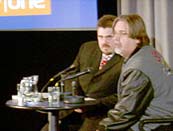 Why some cartoons have life, and some don't.
Why some cartoons have life, and some don't.
To introduce the first piece of animation, Phil Jupitus asked Matt Groening about what influenced him to go into animation. Matt's father was a cartoonist and film-maker. Matt once asked his dad why he hadn't made cartoons himself. His dad replied that it was just too darn hard - the trick was to create the characters and get other people to do all of the work!
One of the things Matt was taught was that 'some cartoons have life, and other's don't'. Matt was inspired by Jay Ward's 1960s Rocky and Bullwinkle cartoons, which he thinks are full of life.
'Although they were poorly animated, they had great writing, good voices and good music. When we started the Simpsons, I didn't think we'd get great animation. But what really works in the show is the great writing, voices and music.'
As an example of great cartoon scripting, Matt showed Koko's Earth Control - ironically, a silent animation. Made in 1928, it features a clown and his dog ending the world after finding the Earth's control room, and pulling the self destruct lever.
'I first saw it when I was about 10. I just love the dog wanting to pull the lever. Bush is the clown... it's a great comment on the current world situation.'
Matt has paid tribute to the cartoon in Futurama - it appears briefly as one of the clips on the giant billboard in the opening sequence.

